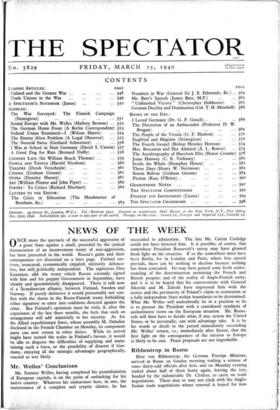Mr. Welles' Conclusions
Mr. Sumner Welles, having completed his perambulation of European capitals, is on the point of embarking for his native country. Whatever his endeavours here, in one, the maintenance of a complete and cryptic silence, he has succeeded to admiration. The late Mr. Calvin Coolidge could not have bettered him. It is possible, of course, that somewhere President Roosevelt's envoy may have gleaned fresh light on the situation. If so the somewhere must have been Berlin, for in London and Paris, where free speech prevails, there can be nothing to disclose because nothing has been concealed. He may have gained some fresh under- standing of the determination animating the French and British peoples, and of the reality of Anglo-French unity, and it is to be hoped that his conversations with General Sikorski and M. Zaleski have impressed him with the justice and the pertinacity of Poland's claim to restoration as a fully independent State within boundaries to be determined. What Mr. Welles will undoubtedly be in a position to do is to present the President with a considered synthesis of authoritative views on the European situation. Mr. Roose- velt will then have to decide what, if any, acuon the United States, or he personally, can with advantage take. It is by his words or deeds in the period immediately succeeding Mr. Welles' return, i.e., immediately after Easter, that the first light on the consequences of the mission to Europe is likely to be cast. Peace proposals are not improbable.






















































